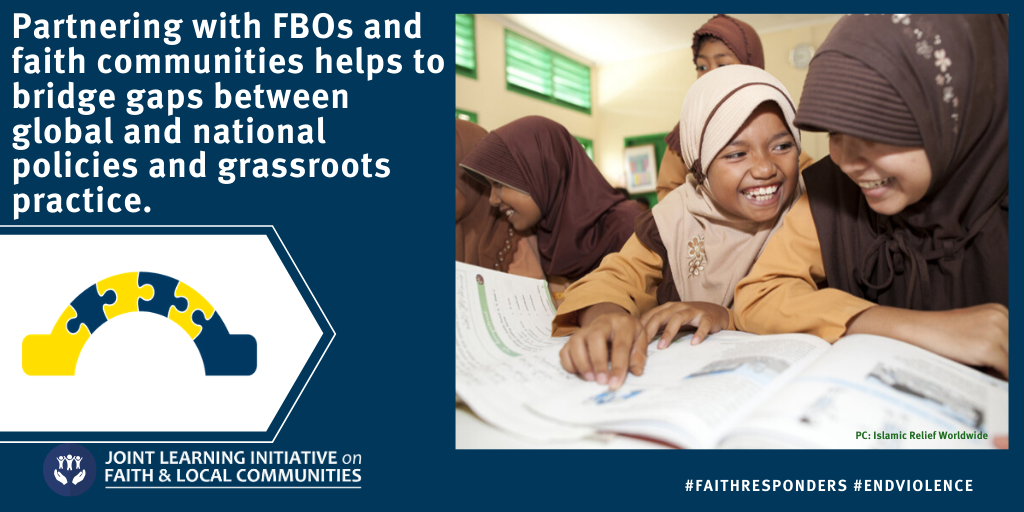
Faith actors can serve as important partners to global and governmental initiatives to end violence against children. Faith-based organizations can have greater social capital than governments and NGOs, and are able to reach and influence the public more regularly and consistently. This page aims to provide examples and resources that speak to the importance and benefits of partnering with faith actors for the shared task of ending violence against children.
Some of the parents, when we meet them they will give testimonies, ‘I used to abuse my children a lot, not giving them food or this, but as soon as they asked us to pray more often…’, you will find the parents changed. The way they are abusing their children, or not giving them food. (UV, Practitioner serving multiple faith communities, Tanzania)
Practice Examples:
Example 1: National Advocacy Campaign Against Child Maltreatment
- Organization: Senegal Ministry of Family and Children, UNICEF, & prominent Islamic religious leaders & networks
- Timeline: 2017
- Project: The Senegal Ministry of Family and Children, with support from UNICEF and Islamic leaders, conducted a study to highlight language in the Qur’an and other Islamic texts which emphasized and supported the safety and protection of children.
- Results: As a result, there was agreement on the Qur’an’s emphasis on child protection and positive parenting, and these issues, along with discussions on the negative consequences of child exploitation and labor, were discussed on national radio and television during Ramadan. This synergy between local and international advocacy levels seemed to work effectively in raising awareness of what is possible for faith communities in the area of ending violence against children.
- Read more in the JLI’s Scoping Study (Rutledge, K. and Eyber, C. 2019, pg. 16), or find the full case study and UNICEF report here.
Example 2: Church Leaders in Nepal Intervening to Prevent Child Trafficking
- Organization: CarNet Nepal (a faith-inspired NGO that works with local communities and faith groups to prevent human trafficking)
- Project: After churches in the Bageshwori Village Development Committee in central Nepal learned that a number of children in their area had been reported missing, church leaders formed a Child Protection Vigilant Group to actively intervene and protect children from trafficking. With the support of CarNet Nepal, a partner agency of the international FBO Viva, the Child Protection Vigilant Group is able to collect data about vulnerable children and, where possible, support them by providing clothing so they can attend school.
- Read more in the JLI’s Scoping Study (Rutledge, K. and Eyber, C. 2019, pg. 18), or find the full UNICEF report here.
Example 3: UNICEF Panama and COEPA
- Organization: UNICEF Panama and COEPA
- The Project: UNICEF Panama and COEPA’s (the inter-religious council of Panama) partnership has brought together diverse denominations in Panama to advocate for ending violence against children. The core of the initiative is to see enhanced cooperation among these groups, supported by UNICEF engagement, and reinforced by increased youth participation and empowerment so that young people are less affected by domestic violence and child abuse.
- The Results: Studies show that young people in Panama particularly trust their religious leaders. Outreach within youth groups and at the Youth Assembly has been a primary way to reach adolescents with messages about child rights. The partnership between UNICEF and COEPA has increased faith-based activities focused on EVAC in Panama. Now that the youth are becoming more involved in the community, they have also started to become leaders in advocating for their own rights and encouraging nonviolence. One of the policies they are hoping to encourage leaders to work on is advocating for an integrated child protection system. (Stacy Nam, Dr. Olivia Wilkinson and Maya Casagrande 2019).
- Find the full FPCC case study here.
Related resources:
See Scoping Study’s next key message.
Haga clic aquí para español

